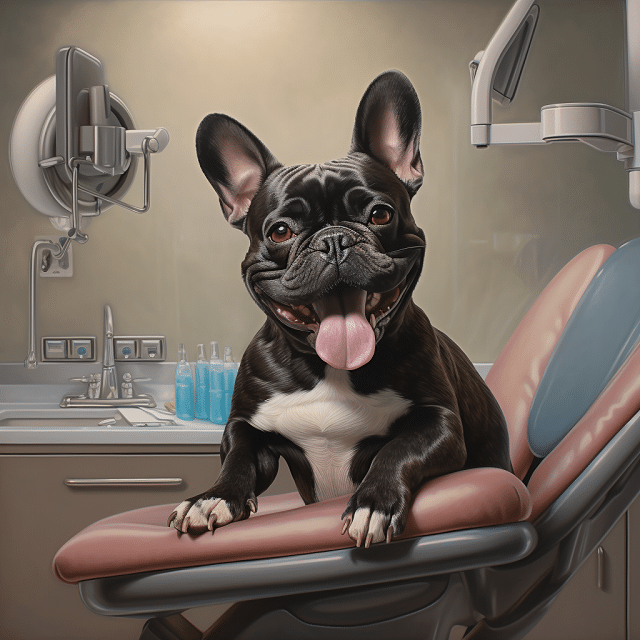Did you know that over 80% of French Bulldogs suffer from dental issues? As a proud Frenchie owner, it’s vital you’re aware of these problems. Your pup’s unique facial structure often leads to tooth decay and gum infections. Don’t worry! With regular check-ups and a good home care routine, you can help protect your pet’s teeth. Let’s dive into understanding the common dental issues in French Bulldogs and how to effectively manage them.
Understanding the Dental Structure of French Bulldogs
It’s important to comprehend the dental structure of French Bulldogs, as they’re prone to teeth issues. Their compact skeletal structure often leads to overcrowded and misaligned teeth, creating a breeding ground for various dental problems.
Because their mouths are significantly smaller than those of other dogs, maintaining oral hygiene can be quite challenging. Food particles can easily get trapped between their tightly packed teeth, leading to tooth decay if not cleaned regularly. This issue is exacerbated by the fact that French Bulldogs’ unique facial anatomy makes them more susceptible to gum disease due to the limited circulation in their gums.
Studies have shown that poor oral hygiene in dogs correlates with an increased risk of periodontal disease. Tooth decay and gum disease aren’t merely painful; they can lead to systemic health issues affecting major organs such as the heart and kidneys if left untreated.
For your Frenchie’s overall wellness, it’s crucial you make regular dental cleaning a part of their routine care regimen. Dental cleaning helps eliminate plaque buildup before it hardens into tartar, which is much harder to remove and can cause serious damage over time.
In conclusion, understanding your Frenchie’s unique dental structure provides the foundation for proactive prevention and treatment of potential dental problems. Regular vet check-ups should also be part of your dog’s healthcare plan as early detection increases success rates in treating these common yet detrimental conditions.
Remember – preventing tooth decay and gum disease isn’t just about fresh breath or aesthetics; it’s about ensuring your pet’s longevity and quality of life.
Common Dental Problems in French Bulldogs
You’re likely to encounter a variety of dental problems in these dogs, such as gum disease, tooth decay, and bad breath. French Bulldogs are predisposed to these conditions due to their unique dental structure and genetic predisposition. Regular check-ups are crucial for early detection and prevention.
Tooth decay is one of the most common issues in French Bulldogs. It’s primarily caused by plaque build-up leading to cavities which can cause severe pain and may require tooth extraction if not treated promptly.
Gum disease or periodontal disease is another frequent issue that arises due to the accumulation of bacteria along the gum line. This condition can lead to inflammation, bleeding gums, loss of teeth, and can even impact your dog’s heart health if left untreated.
Bad breath isn’t just an inconvenience; it could be an indication of underlying dental problems like gingivitis or periodontitis. Persistent foul odor should prompt a visit to the vet.
There are specific warning signs you need to look out for:
- Red or swollen gums
- Difficulty chewing or drop in appetite
- Yellowish-brown crust along the gum line
As with any breed, maintaining good oral hygiene is paramount in preventing these conditions from developing into serious issues. Regular brushing using dog-specific toothpaste, providing chew toys that promote dental health, feeding balanced meals and scheduling regular vet visits will go a long way in ensuring your French Bulldog’s oral health remains optimal.
Make sure you don’t ignore their dental care because it plays a crucial role in their overall well-being.

The Importance of Regular Dental Check-ups
Regular vet check-ups shouldn’t be overlooked as they’re instrumental in detecting and preventing dental problems. The benefits of professional cleanings are numerous, particularly for breeds like French Bulldogs that are predisposed to dental issues. Vets use specialized tools to remove plaque and tartar build-up, hard-to-reach areas you might miss during regular home cleaning.
Be vigilant about the signs of dental issues. Bad breath, difficulty eating, excessive drooling or pawing at the mouth can indicate a problem. If your furry friend shows any of these symptoms, it’s imperative to schedule a vet visit promptly.
The importance of dental hygiene goes beyond fresh breath and white teeth; it’s crucial for overall health. Dental diseases can lead to serious complications if left untreated, including heart disease and infections that can spread throughout the body.
Invest in quality dental care products for your pet’s oral health upkeep between professional cleanings. Look for toothbrushes designed specifically for dogs’ mouths—ideally ones with soft bristles—and canine toothpaste (human toothpaste contains ingredients harmful to dogs). Dental chews also help control plaque build-up while providing an enjoyable activity for your pet.
Preventing dental diseases primarily involves consistent oral hygiene practices coupled with regular veterinarian check-ups. Remember that every step taken towards maintaining good oral health is a step away from painful and expensive veterinary procedures down the line.
Home Dental Care Tips for French Bulldogs
Don’t underestimate the power of a good dental care routine at home for your pet’s oral health. A well-rounded home dental care regimen can substantially reduce the risk and severity of dental diseases in your French Bulldog. This is particularly important as this breed, like all brachycephalic dogs, are predisposed to teeth issues due to their unique skull structure.
Here are three strategies you can implement right away:
- Brushing techniques: Brush your pet’s teeth daily with a soft-bristled toothbrush and dog-safe toothpaste. Use circular motions and ensure you reach the gum line where bacteria often hide.
- Dental chews and toys: These products are designed to mechanically clean your pet’s teeth as they chew on them. They can help remove plaque before it hardens into tartar.
- Natural remedies: Certain foods like raw carrots or apple slices can aid in cleaning your dog’s teeth naturally.
Remember though, while these methods contribute significantly towards maintaining oral hygiene, they’re not substitutes for professional cleanings; these should be conducted by veterinarians regularly based on their recommendations.
The Role of Diet in Dental Health
It’s important to understand that what your pet eats can significantly impact its oral health. The role of diet in dental health is crucial, especially when it comes to French Bulldogs who are prone to teeth issues. The benefits of proper nutrition extend beyond weight management and overall well-being; they directly influence the condition of your pet’s teeth and gums.
Your food choices for your Frenchie have a substantial impact on their dental health. Foods high in sugars or carbohydrates can lead to plaque accumulation, which eventually hardens into tartar, leading to periodontal disease. On the other hand, a balanced diet rich in proteins, vitamins, and minerals can promote healthier gums and prevent dental issues.
One cannot overstate the importance of calcium and phosphorous for strong teeth. These minerals help maintain tooth enamel’s integrity – the first line of defense against cavities and decay. Omega-3 fatty acids found in fish oil are beneficial for reducing inflammation associated with gum diseases.
Furthermore, consider incorporating more ‘dental-friendly’ foods into your Frenchie’s diet such as crunchy kibbles or specially designed dental treats that help scrape off plaque from the teeth during chewing. Raw bones (under supervision) could also contribute positively due to their abrasive effect.
What to Expect During a Dental Cleaning Procedure
You’ll find that during a dental cleaning procedure, your pet’s oral health is thoroughly assessed and any plaque or tartar is carefully removed. This process not only ensures the overall health of your furry friend but also prevents potential complications such as periodontal disease and tooth decay.
Preparing for cleaning, you should know it involves a fair amount of planning. Your vet will conduct an initial evaluation to determine the extent of cleaning required and whether anesthesia will be necessary. Anesthesia risks exist, although minimal in healthy pets, they increase with age or underlying medical conditions. Therefore, pre-anesthetic blood work might be recommended to assess organ function and ensure safe anesthesia.
The post-procedure care includes monitoring your pet for unusual behaviors indicative of pain or discomfort and ensuring they’re eating properly. Antibiotics may be prescribed if there were signs of infection before the procedure.
Cost considerations are significant as these procedures can range from $200 to $800 depending on factors like:
- The severity of dental disease.
- The necessity for extractions.
- The geographic location of veterinary services.
It’s essential to discuss all these aspects with your vet beforehand so you’re well-prepared for what lies ahead. Regular at-home maintenance can help reduce the frequency (and cost) of professional cleanings while keeping your pet’s teeth healthy. Maintaining their oral hygiene is a small price to pay when considering the benefits it brings to their quality life: less discomfort, better breath, improved appetite, and potentially longer lifespan!

Frequently Asked Questions
What Are the Genetic Factors That Can Affect a French Bulldog’s Dental Health?
Genetic factors can significantly impact your dog’s dental health. Breeding influence plays a major role, with certain breeds predisposed to dental diseases. Lack of proper dental care can lead to tooth decay. It’s important to consider genetic testing for hereditary conditions that may affect their teeth. Remember, maintaining good oral hygiene is crucial in preventing any potential issues.
How Can French Bulldog Teeth Issues Impact Their Overall Health and Wellbeing?
When you neglect your dog’s teeth issues, it can have severe implications on their overall health and wellbeing. Poor dental hygiene may lead to oral infections, requiring painful tooth extractions. This not only affects their ability to eat properly, impacting nutritional intake, but also necessitates careful pain management and preventative care. So, ensure proper dental care for your pet to avoid such complications.
Are There Specific Types of Toys or Chews That Can Help Prevent Dental Issues in French Bulldogs?
Yes, certain toys and chews can aid in preventing dental issues. Opt for chew toys made of durable material that can withstand rigorous gnawing. Your dog’s diet also influences oral health, so consider food that promotes dental hygiene. Regular brushing techniques play a vital role too. Dental vet visits are crucial for early detection of any problems while preventive measures like sealants can protect against tooth decay and gum disease.
What Are the Signs That My French Bulldog Needs Immediate Dental Attention?
If your dog’s breath smells unusually bad, it may be a sign of dental issues. Also, look out for symptoms of gum infection such as redness and swelling. Tooth decay can present as brown spots or discoloration. Unusual chewing behavior or a decreased appetite could also indicate discomfort caused by dental problems. It’s important to visit the vet promptly if you notice these signs to prevent further complications.
How Does Aging Affect the Dental Health of a French Bulldog?
As your French Bulldog ages, their dental health may decline. Dietary impact can cause tartar build-up, while brushing techniques become more important. Implement preventative measures like regular teeth cleaning and consider annual check-ups to monitor any changes. Dental treatments might be necessary if oral diseases develop. Remember, aging doesn’t have to mean poor dental health for your Frenchie; with proper care, you can keep their smile healthy!
Conclusion
In a nutshell, your Frenchie’s dental health isn’t something to brush off. Their unique tooth structure makes them more prone to dental issues. Regular check-ups, home care routines, and a proper diet can keep their pearly whites in tip-top shape. Remember, an ounce of prevention is worth a pound of cure!

